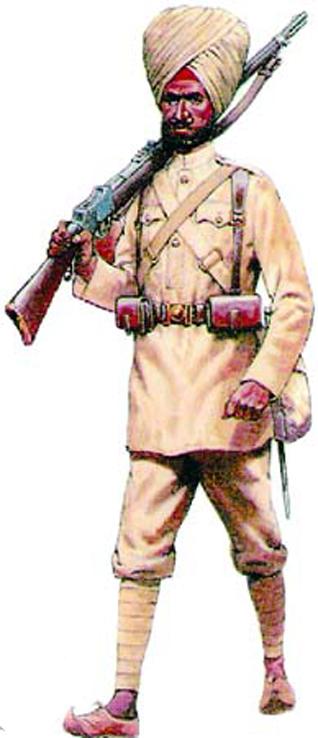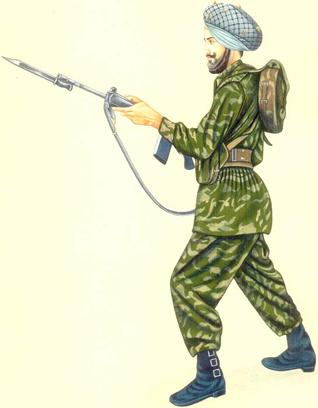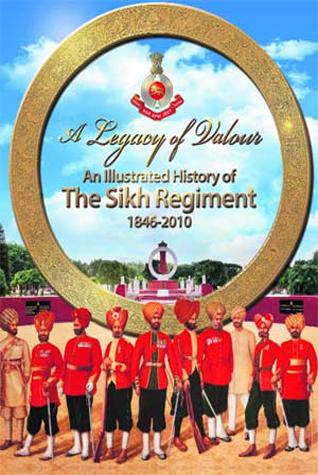A Legacy of Valour:
The Sikh Regiment [1846-2010]
EXCERPT
THE FOLLOWING IS THE sikhchic.com BOOK OF THE MONTH SELECTION FOR FEBRUARY 2012
A LEGACY OF VALOUR: AN ILLUSTRATED HISTORY OF THE SIKH REGIMENT [1846 - 2010]. Published by The Sikh Regimental Officers' Association. pp351, Rs. 1500.
soora so pehchaaniye jo larey deen ke heyt
purza purza kutt marey
Kabhoo(n) na chhade khet
"They are truly brave who defend the weak and the oppressed
Even when dismembered, they steadfastly refuse to leave the field"
Of the many warlike races in India whose military qualities are of a high order, the Sikhs indisputably take the lead as thoroughly gallant and reliable soldiers. They are sturdy, independent, patient and have the ability to perform vigorous manual labour.
"In war", writes a British Officer, "under stress, there is no one like the Sikh; work him almost to death and he is magnificent."
Sikhs cannot sit idle and always want something to do. Officers are therefore recommended to keep them busy and occupied in some useful and constructive work; be it training, education, interior economy, sports or other regimental activities.
In the Handbook on Sikhs for Regimental Officers, Captain Falcon observed: "The new creed has added a more ardent military spirit ... The Sikh is a fighting man and his fine qualities are best shown in the army, which is his natural profession ... Hardy, obedient to discipline; attached to his officers; and careless of caste prohibitions, he is unsurpassed as a soldier in the East and takes the first place as a thoroughly reliable, useful soldier. The Sikh is always the same, ever genial, good tempered and uncomplaining; as steady under fire as he is eager for a charge."
It was in the Khyber Pakhtunkhwa that the Sikh forces under the command of the legendary General Hari Singh Nalwa [of Maharaja Ranjit Singh's Army] had successfully and very effectively subjugated the Afghans and the unruly Pashtun tribesmen.
Following the annexation of Punjab by the British, between 1850 and 1870, some 26 expeditions were launched by the British against the tribesmen. In the full 80 years of involvement in the North-West Frontier Province, it was no surprise that a fairly large percentage of the troops employed were of the Sikh Regiment (Regt).
During these forays the valour of the Sikhs was outstanding and by the turn of the century, in addition to two Victoria Crosses and a large number of gallantry honours, the Battalions of the Regiment were awarded 15 Battle Honours.
* * * * *
The First World War had dragged on into its second year. In March 1915, XV Sikhs was allotted a prestigious objective; the trench line on the Aubers Ridge, Ligny de Grande, which was to become the Second Battle of Ypres. The battle raged on for four days, trenches exchanging hands several times, but the final gains of the entire Corps was only a salient around 1000 yards deep with a two mile plus wide frontage.
On 27 April 1915, XV Sikhs played a unique part in the battle for retaining Ypres. When the joint Anglo-French offensive failed, the Commanding Officer saw the French not only withdrawing from the line of action, but also from their trenches. He sent a company of XV Sikhs to plug the French defences and save it from falling into German hands.
It was now the turn of XV Sikhs to be in the limelight, and it was here that Lt. John Smyth did the Regiment proud. On 15 May, while the Jullundur Brigade manned the defences, the Sirhind Brigade launched its second attack. On 16 May, XV Sikhs was moved to the trenches running parallel to the Rue des Chevattes. They stayed there during that and subsequent nights. On 18 May, XV Sikhs occupied the captured German trenches near Richebourg L'Avoue, where they remained till 20 May. It was here on 18 May that Lt. John Smyth won his Victoria Cross.
The Sikhs were in occupation of a section of a German trench, the rest of which was still held by the enemy. With substantial reinforcements, the Germans had succeeded in erecting a strong barricade between themselves and the British. A hail of bombs began to fall among the Sikhs who replied vigorously with considerable effect, until towards noon their supply of bombs began to run out. The situation turned critical and only a speedy arrival of a bombing party from the reserve trenches would enable them to hold out.
The reserve trench was only 250 yards away, but the ground between was so exposed to enemy fire that it rendered the dispatch of reinforcements a most desperate undertaking.
The Sikhs resolved to take their chances. Although no one doubted that almost certain death awaited them, on volunteers being called every man stepped forward. Ten men were selected and placed under the command of Lt. John Smyth, who had already distinguished himself, on more than one occasion, by his dashing courage. He and his small band of Sikhs set out on their perilous enterprise taking with them two boxes containing 96 bombs. The ground over which they had to traverse was absolutely devoid of any natural cover.
Tying their puggrris to the boxes, the Sikhs in front pulled at them while those behind pushed with all their might, thus transporting the bombs across the exposed ground and through the dead bodies. The enemy had observed them cross and rifle and machine gun bullets ripped the ground around them, while air bursts scattered shrapnel. It was certain that if a single fragment of shell penetrated one of the boxes of explosives, the men would be blown to smithereens.
When they had advanced a little distance on their horrific journey, four Sikhs (Sepoy Fateh Singh, Sepoy Sucha Singh, Sepoy Ujagar Singh and Sepoy Sunder Singh) were wounded, leaving Lt. Smyth with only six men to propel the boxes along. However, spurred on by the thought of the dire necessity of their comrades ahead, through superhuman effort and good fortune, courage and fortitude, they succeeded in dragging the boxes nearly to the end of the trench. However, in quick succession two more men (Sepoy Ganga Singh and Naik Mangal Singh) were wounded and three Sepoys (Sarain Singh, Harnam Singh and Sapooran Singh) killed.
The second box of bombs had, therefore, to be abandoned and for the two remaining men to haul even one box along in the face of such difficulties, appeared an impossible task, but anxious watchers in the trench ahead saw them wriggling their way yard by yard into the open, hauling the box with them.
As the bombing party emerged from comparative shelter of the trench, a veritable hail of lead burst upon them; miraculously eluding them. Struggling with their precious burden, the two brave men (Lt. John Smyth and Sepoy Lal Singh) were within minutes amongst their cheering comrades. Both were unhurt, though their clothes were perforated with bullet holes. Scarcely had they reached their trench when the gallant Sepoy Lal Singh, the last man standing with Smyth, was struck by a bullet and killed instantly. Lt. Smyth's determination was triumphant, the task having been facilitated to the last by the ten brave Sikhs.
For his most conspicuous bravery, Lt. John Smyth was awarded the Victoria Cross and each of the ten brave men of the Sikhs who accompanied him were awarded an Indian Distinguished Service Medal (IDSM), while Naik Mangal Singh won an IOM.
It was Saragarhi with a difference - different terrain, different time, but with the same characteristic bravery and limitless courage. Laurels had now been won by both the Sikh battalions, and every heart glowed with pride; the crowning accolade coming from the mention of the Sikh battalion's gallantry in the Battle of Festubert, in the House of Commons.
January 29, 2012
Conversation about this article
1: Baldev Singh (Bradford, United Kingdom), January 29, 2012, 11:26 AM.
The Sikh Regiments have won 27 Battle Honours, 15 Theatre Honours ... A Nation without their own State! ... They have fought for everyone else's freedom!
2: Sangat Singh (Kuala Lumpur, Malaysia), January 29, 2012, 11:59 AM.
The legendary Sam Manekshaw, a great soldier and war hero, became the 8th Chief of Army Staff of India in 1969. He had served in the 54th Sikh Regiment and held in such high esteem that on becoming Commander-in-Chief, issued instructions to his security detail and guards that if anyone, repeat, anyone, from the Sikh Regiment wished to see him, he was to be admitted immediately, no matter what the Chief was doing. Such was the tribute he paid to the braves of the 54th Sikh Regiment.
3: Gurjender Singh (Maryland, U.S.A.), January 30, 2012, 8:18 PM.
Since the 19th century, the Sikh Regiment has been glorious because it has truly been a "Sikh" regiment. Now, India has been bent on destroying its legacy and its future by adding others (non-Sikhs) to it. Now, it is a Sikh Regiment in name only and lost its lustre.
4: Sukhindarpal Singh (Penang, Malaysia), January 31, 2012, 9:43 AM.
My paternal grand father, Havlidar Kabal Singh, served with the 36 SIKH REGIMENT in France all the way through to a stint in Beijing, so I was told! I want a copy of the book!
5: Roopinder Singh Bains (Surrey, British Columbia, Canada), January 31, 2012, 9:59 PM.
My grandfather and his two younger brothers served in the Sikh Regiment. Where can we purchase a copy of this book in Canada?
6: Ashok Arora (Chandigarh, Punjab), February 02, 2012, 6:10 AM.
Where can we get this book?
7: Rose Chawla (India), February 06, 2012, 1:37 AM.
I have looked everywhere for the book but am unable to get a copy. Please suggest where I can get the book in New Delhi, India. [EDITOR: We have initiated some enquiries - we will let you know soon as we get some more info.]
8: Virindra Singh Behla (Chandigarh, Punjab), January 13, 2015, 8:55 AM.
My grandfather was a doctor attached to 44 SIKHS. Fought in Mesopotomia, Egypt and Turkey. He quit the Army after the war as a protest against the British occupation of Punjab and the subcontinent. A brave man.






